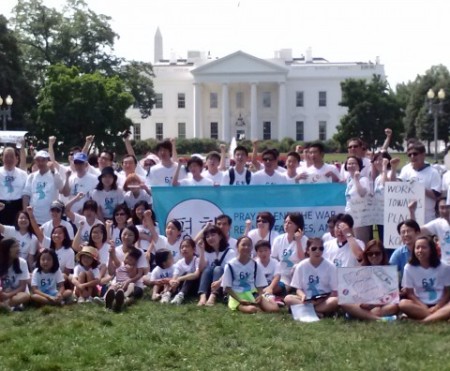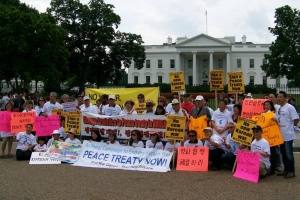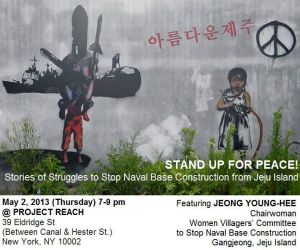By Christine Ahn | August 15, 2014
Originally published by the Korea Policy Institute
As I stood on the podium at Lafayette Park looking out into the crowd of over 200 people, I couldn’t help but be moved to tears. Four generations of Korean-Americans had just marched from the Foundry United Methodist Church to gather in front of the White House, from children in elementary school to elders who had devoted their entire lives to working for peace and the reunification of their homelands. We chanted, “What do we want? Peace Treaty! When do we want it? Now!”
The peace march and vigil was organized by an ecumenical committee of faith leaders from the World Council of Churches, National Council of Churches of Korea, United Methodist Church, United Methodist Women, United Church of Christ, among several others. The committee had organized a two-day gathering in Washington, DC on July 25 and 26, 2014 that, in addition to the march and rally, included an ecumenical roundtable, advocacy visits with the White House and Ambassador Robert King, Special Envoy on North Korea Human Rights, and an evening film screening of Memory of Forgotten War by Ramsay Liem and Deann Borshay Liem.
The occasion was the 61st anniversary of the Armistice Agreement that halted the Korean War. The United States, China and North Korea signed the Armistice on July 27, 1953 committing to replace it with a permanent peace treaty. Six decades later, we’re still waiting.
I began my rally speech by recalling President Obama’s words at the Korean War memorial last year on the 60th anniversary of the armistice agreement as he spoke to war veterans from the United States and South Korea: “Here, today, we can say with confidence that this war was no tie. Korea was a victory.”
A victory? How could a war that claimed four million, mostly civilian lives, be considered a victory? How could it be a victory to the 10 million families who are still separated by the world’s most militarized border with 1.2 million landmines? How is it a victory for the millions of North Koreans living under the harshest sanctions ever, struggling to access food, medicines and the basics to lead a life of dignity? How it is a victory for democracy where the militarization and repression on both sides of the De-Militarized Zone (DMZ) has imprisoned the Korean people to live in a constant state of fear and war? We gathered in front of the White House to let President Obama know that the Korean War was far from victorious, and that the United States, as a key signatory to the Armistice Agreement, has a responsibility to end the Korean War.
We were also there to let the Obama administration know that its North Korea policy, known as “strategic patience,” has been an utter failure. A combination of military aggression and intensified economic sanctions to force Pyongyang to de-nuclearize, Obama’s policy was created on the assumption that once Kim Jong-il passed away, internal strife in North Korea would lead to regime collapse.
To the contrary, since Obama took over, North Korea conducted two nuclear tests and several short, medium and long-range missiles. Experts across a wide political spectrum are calling Obama’s “strategic patience” a failure, and U.S. military experts have warned about the danger of a miscalculation. Robert Einhorn, Obama’s Special Advisor for Nonproliferation and Arms Control from 2009-2013, states bluntly: “U.S. policy toward North Korea is dead in the water.”
Unfortunately, South Korean President Park Geun-hye hasn’t made any substantive changes in Seoul’s position vis-à-vis Pyongyang. While Park’s rhetoric idealizes the potential of reunification, particularly in terms of economic growth and access to North Korea’s vast mineral resources, Seoul’s policy, like Washington’s, still hinges on denuclearization and improving human rights before engagement.
That’s why the Korean American faith community, bolstered by its American allies, gathered in Washington, DC—to educate U.S. policymakers and each other on why the Korean War must end. Here are five reasons why President Obama must sign a peace treaty to formally end the Korean War:
1. SUPPORT THE REUNIFICATION OF DIVIDED FAMILIES
Approximately 10 million Korean families are still separated due to the division of Korea by the most militarized border in the world. Every year, thousands of elders pass away without having seen their loved ones for over 60 years. In her Dresden speech, President Park said:
“It has been 70 long years. Last year alone, some three thousand eight hundred people who have yearned a lifetime just to be able to hold their sons’ and daughters’ hands — just to know whether they’re alive – passed away with their unfulfilled dreams.”
Whether conservative or liberal, the issue of divided families strikes a chord in the hearts of all Koreans, their families and communities. Every Korean family has a story. I shared the story of my sister who told me that when she met her in-laws, after a long evening of getting to know each other, the father disclosed to her that he actually had a family in the North, a wife and two sons, which he had left behind before the Korean War broke out. Once the border was drawn, he was not able to ever see them again. After trying for many years to get in touch with them, he gave up and re-married. He told my sister, “I still really miss them. Those are my children I left behind.” He recently died with the picture of his North Korean family in his pocket.
After a decade of family reunifications under the Sunshine Policy of former South Korean Presidents Kim Dae Jung and Roh Moo Hyun, family meetings were virtually stopped by his successor, President Lee Myung Bak. Under Park, reunions have been on again, off again, but with political support from Washington, they could be revived on a regular basis. Congressional resolutions in 2001 endorsed family reunifications stating: “Resolved by the House of Representatives (the Senate concurring), that it is the sense of Congress that… Congress and the President should support efforts to reunite people of the United States of Korean ancestry with their families in North Korea….” We should thus urge the revival of U.S. support of family reunifications.
3. DE-ESCALATE TENSIONS THAT THREATEN REGIONAL WAR
The U.S. has come dangerously close to being unintentionally drawn into a full-scale war due to skirmishes in Korea. Last spring, the conflict spiraled dangerously out of control when, in response to North Korea’s nuclear test, Washington dispatched, in an unprecedented show of force, nuclear-capable B-52 and stealth B-2 bombers and F-22 warplanes across Korean seas and skies during war games with Seoul. In response, Pyongyang shifted its rhetoric from Seoul to Washington, threatening “merciless strikes” on the U.S. and its allies.
Most Americans don’t realize this, but the Combined Forces Command (CFC) is led by a four-star American general with wartime Operational Control (OPCON) over South Korea. U.S.-R.O.K. military exercises, which simulate nuclear attack and regime change of North Korea, not only heighten tensions with Pyongyang but also Beijing, which is using this show of force and the U.S. pivot to Asia to justify double digit annual increases in military expenditures.
The U.S. intelligence community understands that North Korea is pursuing nuclear weapons as a deterrent. Donald Gregg, former CIA Director of Korea and Ambassador from 1989-99 said:
“Kim is apparently showing his intent to develop his country’s nuclear capabilities not as a threat, but as a deterrent. The country’s nuclear program has destabilized the region and prompted Japan to consider developing its own nuclear program, which highlights the need for dialogue.”
With nearly 70 million Koreans on the peninsula, the outbreak of war would be devastating. In 1994—twenty years ago before North Korea acquired nuclear weapons—the U.S. Defense Department calculated that another war in Korea would result in 1.5 million casualties within 24 hours of the outbreak of hostilities. Not only would the U.S. be drawn into war by treaty, the conflict would likely draw in other regional powers such as China, Japan and Russia. Americans don’t want to be involved in another military conflict that could be resolved diplomatically.
3. IMPROVE NORTH KOREAN HUMAN RIGHTS BY LIFTING SANCTIONS
What most Americans don’t understand is how U.S. sanctions policy—intended to put pressure on the Kim regime—has served as a chokehold on the North Korean economy and ordinary people. The ability of the people to access the basics—from food to seeds to medicine to technology—is greatly strained by U.S.-led international sanctions against the DPRK.
There is wide consensus on how U.S.-led sanctions harm the day-to-day lives of ordinary North Korean people, from former U.S. Presidents, Nobel Peace Laureates, humanitarian workers and physicians. On his last trip to North Korea, former U.S. President Jimmy Carter said:
“In almost any case when there are sanctions against an entire people, the people suffer the most and the leaders suffer least.” In the case of North Korea, Carter said that “the last 50 years of deprivation of the North Korean people of adequate access to trade and commerce has been very damaging to their economy.”
Felix Abt, a Swiss businessman and entrepreneur who lived for seven years in North Korea establishing the first-ever business school and joint business ventures, writes in his new book, A Capitalist in North Korea:“North Korea is the most heavily sanctioned nation in the world, and no other people have had to deal with the massive quarantines that Western and Asian powers have enclosed around its economy. These penalties are upsetting from a business standpoint and have only worsened the country’s prospects for developing economically… I lost a multi-million dollar contract for a project to rehabilitate Pyongyang’s water and sewage system…[because] certain types of software that were needed for the project were hit by sanctions from Washington.”
4. SAVE U.S. DOLLARS BY CLOSING BASES AND MILITARY EXERCISES
The unended Korean War provides justification for increasing defense spending and further militarization of the region. At a March 25 Senate Defense Committee hearing on the 2015 budget, the commander of the U.S. Forces in Korea (USFK), General Curtis Scaparrotti, argued that while the 28,500 U.S. troops based in South Korea were “fully resourced,” he was concerned about the readiness of “follow-on” forces needed if fighting erupted, suggesting the need for more resources to Korea.
In response to heightened tensions with Pyongyang, according to journalist Tim Shorrock, a new THAAD portable defense system was deployed to Guam and plans are underway for a massive expansion in U.S. missile defense systems in Alaska and along the west coast as a “precautionary” measure against possible North Korean missile strikes.
Yet there are growing voices calling for a withdrawal of U.S. Forces in Korea—one from the libertarian Cato Institute:
” Washington should disengage from the peninsula. That requires turning security for the South over to Seoul, normalizing relations with North Korea while handing the nuclear issue to its neighbors, and leaving the two Koreas free to decide their future relationship.”
-Doug Bandow, Cato Institute
And another from a U.S. Major in the Army who graduated from West Point, was stationed in South Korea, and is now a Foreign Services Officer advising on East Asian affairs, Christopher Lee:
“Based on new fiscal realities and Seoul’s proven ability to defend its national borders, the U.S. government should immediately conduct the transfer of the wartime operational control (OPCON) to South Korea. The country’s robust military force and its ongoing procurement of advanced military systems, combined with its first-rate economy, afford South Korea the ability to defend itself from most aggressors without substantial involvement of American conventional forces.”
-Christopher Lee, U.S. Major
Lee argues, “U.S. conventional forces no longer hold the same tactical value as they did during the Cold War, and America’s fragile economy cannot continue to withstand the financial drain.” He estimates that a withdrawal of U.S. forces from South Korea could result in savings of $100 million per month, excluding the costs of the annual joint exercises.
5. FORMALLY END THE KOREAN WAR BY SIGNING A PEACE TREATY
There is wide consensus that replacing the temporary armistice agreement with a permanent peace treaty would go a long way towards de-escalating tensions that have long plagued Korea and the region.
In a 2011 paper, the U.S. Army War College warns that the only way to avert a catastrophic confrontation is to “reach agreement on ending the armistice from the Korean War” and “giv[e] a formal security guarantee to North Korea tied to nonproliferation of weapons of mass destruction.”
Across party lines, U.S. Ambassadors to Korea since the 1980s have argued for engagement and a formalized peace process:
“…[I]n order to remove all unnecessary obstacles to progress, is the establishment of a peace treaty to replace the truce that has been in place since 1953. One of the things that have bedeviled all talks until now is the unresolved status of the Korean War…. Absent such a peace treaty, every dispute presents afresh the question of the other side’s legitimacy.”
-James Laney, former U.S.Ambassador under Bill Clinton“[T]he current impasse, which only buys time for North Korea to develop its nuclear program, is unstable and that matters will only get worse if not addressed directly. It’s time for the Obama administration to reopen dialogue with Pyongyang.”
-Robert Gallucci and Stephen Bosworth, The New York Times 2013“I feel similarly about Kim as I and then-President George H. W. Bush did in the 1980s about Mikhail Gorbachev when he became leader of the Soviet Union. In both cases there was a sense that the leader was someone with whom dialogue would be possible.”
–Donald Gregg, former U.S. Ambassador under George H.W. Bush
Gregg believes Kim Jong-Un is someone Washington can negotiate with, not only because he was raised and educated in Europe, but also because by prioritizing economic development and dismissing hard-line generals, he clearly understands the importance of uplifting the living standards of the population and has demonstrated a commitment to that goal.
We must remind our policymakers that Washington was in fact very close to negotiating a peace settlement in 2000 with North Korea. Kim Jong-il had sent Vice Marshal Jo Myong-rok to meet with President Clinton to sign a deal to end Pyongyang’s nuclear and missile program if Washington recognized the DPRK and respected its sovereignty. In late 2000, Secretary of State Madeline Albright went to Pyongyang to meet Kim Jong-Il to finalize a peace settlement, but the peace process was scuttled by the Al Gore-George Bush elections debacle. Soon enough, time ran out and we ended up with President Bush who came into power and offended Kim Dae-Jung’s Sunshine Policy and placed North Korea on the “Axis of Evil.”
These past few years have felt dark and bleak, especially in light of the significant progress Korea had made towards peace and reconciliation. And in these times, we have felt our path may forever be lost. But as in past movements for peace and justice, the ecumenical community has played an important role, driven by its convictions and faith, to push forward and play a courageous role and offer light. After all, it was Korean pastors who urged Jimmy Carter to go to Pyongyang armed with a CNN camera crew to cover the diplomatic breakthrough with Kim Il-Sung that averted war in 1994 and led to the Agreed Framework in which Pyongyang agreed to freeze its plutonium reactors in exchange for energy assistance, and eventual normalization of relations with the U.S.
Our political leaders will not move unless we, the people, move them. A peace treaty would go a long way towards defusing dangerous tensions in Northeast Asia. For the elders dying with their hearts broken, for our families still traumatized by an unended Korean War, and for a brighter future built on peace and hope for a world free from more militarization and war, let there be a peace treaty. The ecumenical forum, peace march and vigil was the beginning of a powerful grassroots force that, I believe, will join together and work to achieve a peace treaty within the final years of the Obama administration.
Christine Ahn is Director of “Women De-Militarize the Zone”, an FPIF columnist, and a Korea Policy Institute Advisory Board member.









